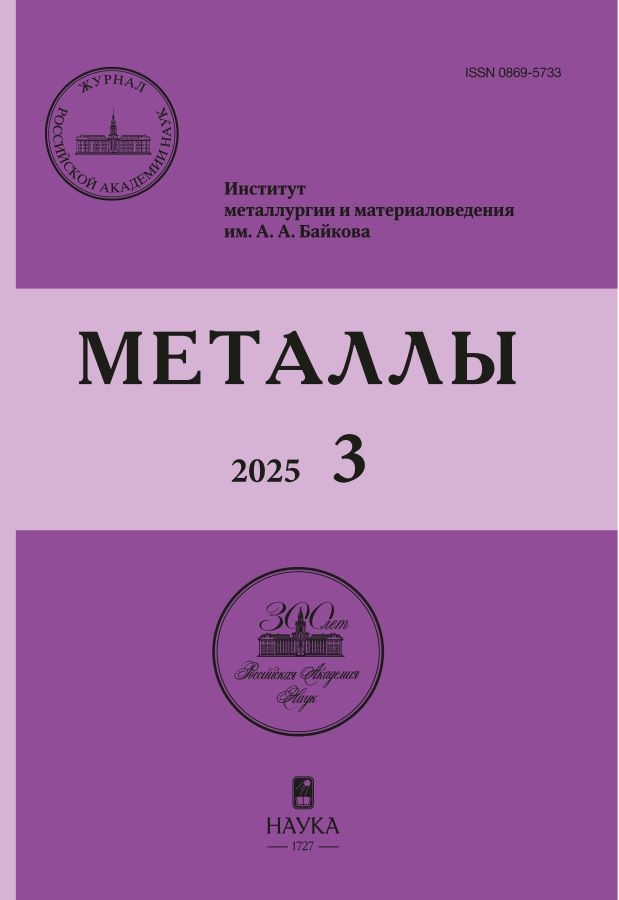Influence of Heat Treatment on the Mechanical and Thermomechanical Characteristics of a Ti50Pd30Ni20 Alloy with High-Temperature Shape Memory Effect
- Authors: Popov N.N.1, Presnyakov D.V.1, Ryzhov I.S.1, Kostyleva A.A1
-
Affiliations:
- Russian Federal Nuclear Center–All-Russian Research Institute of Experimental Physics (RFNC-VNIIEF)
- Issue: No 6 (2023)
- Pages: 17-25
- Section: Articles
- URL: https://ruspoj.com/0869-5733/article/view/654820
- DOI: https://doi.org/10.31857/S0869573323060034
- EDN: https://elibrary.ru/EJIAFV
- ID: 654820
Cite item
Abstract
Abstract—The influence of annealing at 600°C on the mechanical and thermomechanical characteristics of a Ti50Pd30Ni20 alloy with high-temperature shape memory effect (SME) is studied. The best strength (σu = 1030 ± 140 MPa) and plastic (
About the authors
N. N. Popov
Russian Federal Nuclear Center–All-Russian Research Institute of Experimental Physics (RFNC-VNIIEF)
Email: nnpopov@vniief.ru
Sarov, Nizhny Novgorod oblast, Russia
D. V. Presnyakov
Russian Federal Nuclear Center–All-Russian Research Institute of Experimental Physics (RFNC-VNIIEF)
Email: NNPopov@vniief.ru
Sarov, Nizhny Novgorod oblast, Russia
I. S. Ryzhov
Russian Federal Nuclear Center–All-Russian Research Institute of Experimental Physics (RFNC-VNIIEF)
Email: NNPopov@vniief.ru
Sarov, Nizhny Novgorod oblast, Russia
A. A Kostyleva
Russian Federal Nuclear Center–All-Russian Research Institute of Experimental Physics (RFNC-VNIIEF)
Author for correspondence.
Email: NNPopov@vniief.ru
Sarov, Nizhny Novgorod oblast, Russia
References
- Попов, Н.Н. Влияние отжига на механические и термомеханические характеристики сплава Ti50Pd40Ni10 с высокотемпературным эффектом памяти формы, исследованные на заготовке в виде полосы / Н.Н. Попов, Д.В. Пресняков, В.Ф. Ларькин, Е.Н. Гришин, А.А. Костылева // Металлы. 2021. №4. С.28-40.
- N.N. Popov, D.V. Presnyakov, V.F. Lar'kin, E.N. Grishin, A.A. Kostyleva, "Effect of Annealing on the Mechanical and Thermomechanical Characteristics of a Ti50Pd40Ni10 Alloy with High-Temperature Shape Memory Effect Studied on a Strip".Russian Metallurgy (Metally). 2021. №7. P.830-841.
- Попов, Н.Н. Механические и термомеханические характеристики сплава Ti50Pd50 с высокотемпературным эффектом памяти формы / Н.Н. Попов, Д.В. Пресняков, В.Ф. Ларькин, Е.Н. Гришин, С.В. Глухарева, А.А. Костылева // Материаловедение. 2022. №5. С.22-31.
- Golberg, D. Characteristics of Ti50Pd30Ni20 high-temperature shape memory alloy / D. Golberg, Y. Xu, Y. Murakami, S. Morito, K. Otsuka, T. Ueki, H. Horikawa // Intermetallics. 1995. V.3. №1. P.35-46.
- Noebe, R. Properties of a Ni19,5Pd30Ti50,5 high-temperature shape memory alloy in tension and compression / R. Noebe, S. Padula, G. Bigelow, O. Rios, A. Garg, B. Lerch // SPIE Smart Structures and Materials, Proceedings of SPIE. 2006. №6170. P.279-291.
- Пушин, В.Г. Сплавы никелида титана с памятью формы: в 2 ч. Ч.I. Структура, фазовые превращения и свойства / В.Г. Пушин; под науч. ред. В.Г. Пушина. - Екатеринбург: Изд. УрО РАН. 2006. С.96-112.
- Ma, J. High temperature shape memory alloys /j. Ma, I. Karaman, R. D. Noebe // Intern. Mater. Rev. 2010. V.55. №5. P.257-315.
- Kumar, P.K. Phase transformation and creep behavior in Ti50Pd30Ni20 high temperature shape memory alloy in compression / P.K. Kumar, U. Desai, J. Monroe, D.C. Lagoudas, I. Karaman, R. Noebe, G. Bigelow // SPIE Smart Structures and Materials, Nondestructive Evaluation and Heals Monitoring, Proceedings of SPIE. 2010. №7644. P.166-172.
- Namigata, Y. Enhancement of shape memory properties through precipitation hardening in a Ti-rich Ti-Ni-Pd high temperature shape memory alloy / Y. Namigata, Y. Hattori, M.I. Khan, H.Y. Kim, S. Miyazaki // Mater. Trans. 2016. V.57. №3. P.241-249.
- Кулаичев, А.П. Универсальный программный статистический пакет STADIA (версия 7.0) для Windows / А.П. Кулаичев. - М.: НПО "Информатика и компьютеры", 2007.
- Кулаичев, А.П. Методы и средства комплексного анализа данных / А.П. Кулаичев. - М.: Форум: Инфра-М, 2006. 512 с.
- Степнов, М.Н. Статистические методы обработки результатов механических испытаний / М.Н. Степнов. - М.: Машиностроение, 1985. 232 с.
Supplementary files











